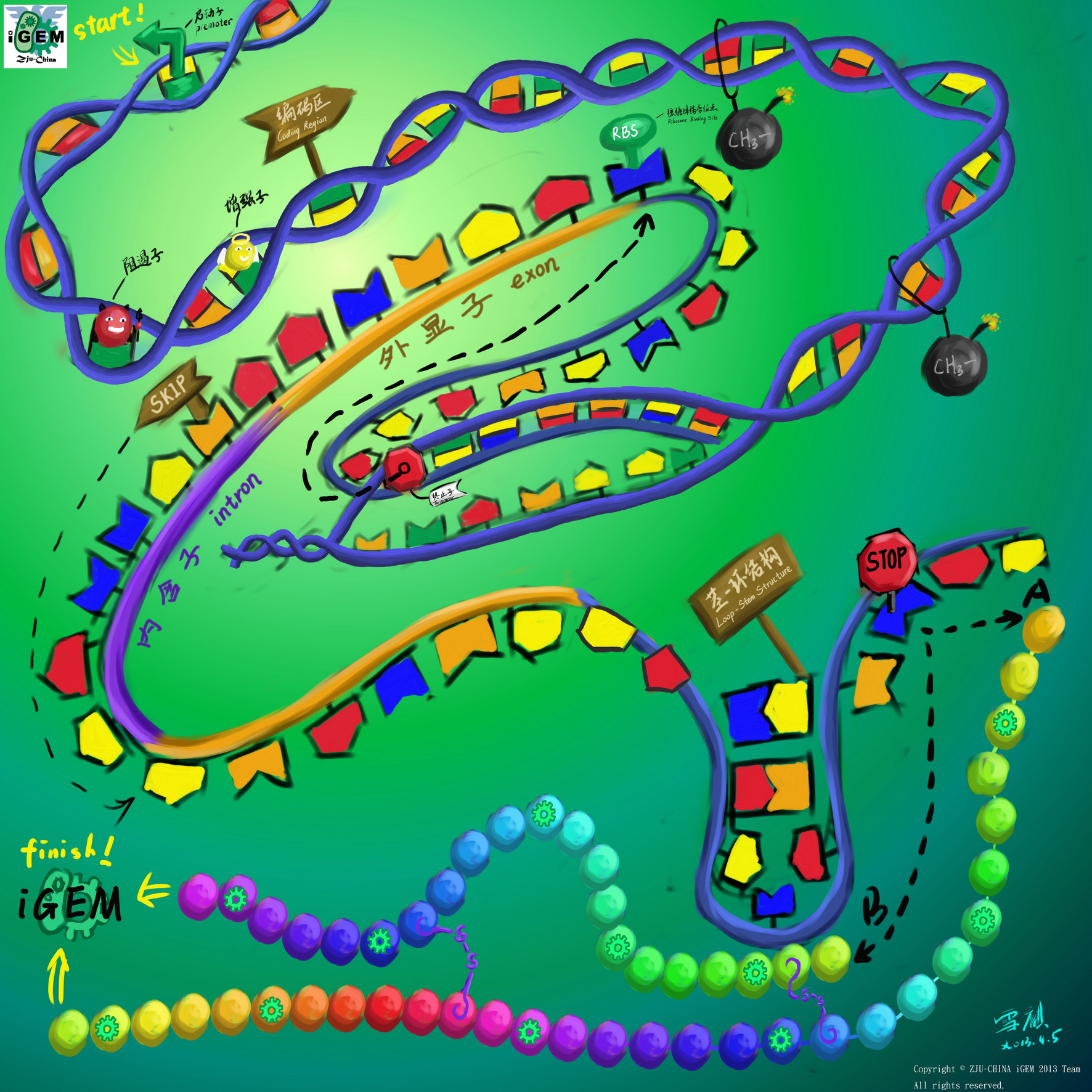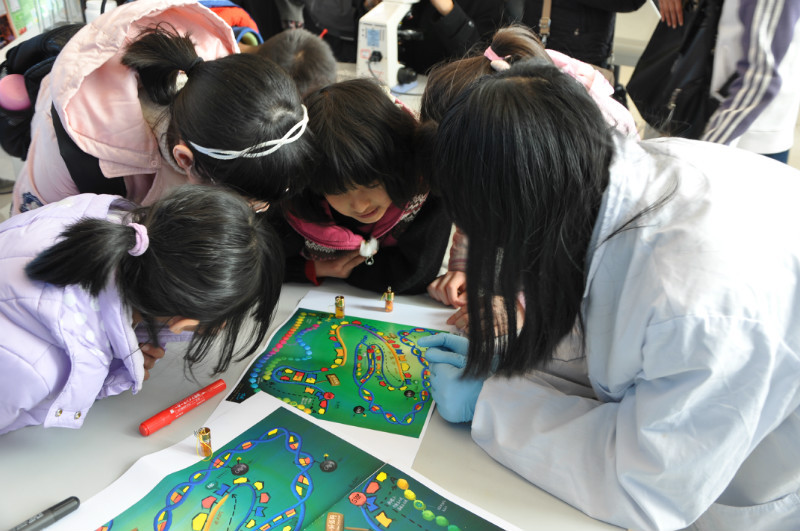Team:ZJU-China/HumanPractice/AChessGame
From 2013.igem.org
m (→Synbio Chess Game) |
|||
| (12 intermediate revisions not shown) | |||
| Line 6: | Line 6: | ||
<div class="container"> | <div class="container"> | ||
<div id="container-wrapper"> | <div id="container-wrapper"> | ||
| - | </html>{{:Team:ZJU-China/template/ | + | </html>{{:Team:ZJU-China/template/humanpractice-menu|AChessGame=checked}}<html> |
<div class="content"> | <div class="content"> | ||
</html> | </html> | ||
| - | == | + | == Synbio Chess Game == |
| - | Synthetic biology is a field of science and engineering based on standard parts. Gene, | + | Synthetic biology is a field of science and engineering based on standard parts. Gene, messenger RNA, and proteins act together to construct and regulate intelligent bio-devices, so it is important to understand central dogma. Therefore, we design a chess game to teach the basic principle of central dogma to the public, and give them joywhen learning biology. The chess game, as such things are never designed before, can be an advance in human practice. |
| + | |||
<center> | <center> | ||
| - | [[File:Gameboard.jpg | + | [[File:Gameboard.jpg|600px]] |
| + | Gameboard designed by Xihan Li | ||
</center> | </center> | ||
| - | This is the board of the game. It is consists of three parts --- | + | |
| + | This is the board of the game. It is consists of three parts --- DNA helix, single strand RNA, and two polypeptide chains. Start from the “start” sign on the top-left, players should go through DNA, RNA, and a polypeptide chain, and finally get to the “iGEM” sign on the bottom-left. The whole journey of the game is like the process of protein synthesis from the transcription of DNA and the translation of RNA. | ||
When a game starts, player dice and move their chessman according to the pips. Note that there are always tricks along the journey! The “start” sign is a promoter, which indicates that the expressions of genes start from promoters. Along the “nucleic road”, we meet repressor the “evil”, and enhancer the “angel”. If a player meet the enhancer, he/she may move the chessman three steps ahead; but if unfortunately he/she meet the repressor, the chessman must be moved three steps backward. | When a game starts, player dice and move their chessman according to the pips. Note that there are always tricks along the journey! The “start” sign is a promoter, which indicates that the expressions of genes start from promoters. Along the “nucleic road”, we meet repressor the “evil”, and enhancer the “angel”. If a player meet the enhancer, he/she may move the chessman three steps ahead; but if unfortunately he/she meet the repressor, the chessman must be moved three steps backward. | ||
| Line 22: | Line 25: | ||
Ahead of enhancer the “angel”, we meet a sign of “coding region”, which indicates that we are now in coding region. Take care of the methyl in this area! If you are unlucky enough to step on it, you must move your chessman back to the promoter! The coding region is rather long. At the end of this area, there is a terminator drawn as a red octagon. However, this time it is lucky enough to step exactly on the terminator. If it does happen, players may move their chessmen to the RBS site through the dotted line. If players are not lucky enough to step exactly on the terminator, he/she must move backward according to the pips on the dice --- For example, if a player is just one step before the terminator, and he/she throws a “three”, then he/she must go one step to the terminator, and then move two steps backward. | Ahead of enhancer the “angel”, we meet a sign of “coding region”, which indicates that we are now in coding region. Take care of the methyl in this area! If you are unlucky enough to step on it, you must move your chessman back to the promoter! The coding region is rather long. At the end of this area, there is a terminator drawn as a red octagon. However, this time it is lucky enough to step exactly on the terminator. If it does happen, players may move their chessmen to the RBS site through the dotted line. If players are not lucky enough to step exactly on the terminator, he/she must move backward according to the pips on the dice --- For example, if a player is just one step before the terminator, and he/she throws a “three”, then he/she must go one step to the terminator, and then move two steps backward. | ||
| - | Now we are at the RBS site, and we are on the | + | Now we are at the RBS site, and we are on the messenger RNA! The first segment of this RNA is an exon, so they are to be translated. Notice that there is a “skip” sign in the middle of the RNA molecule, which act as a separation of exon and intron. Once again, if a player is lucky enough to step exactly on the “skip” sign, he/she may skip the intron and move the chessman through the dotted line. If he/she is not lucky enough, there is no way to skip the intron. |
There is also a segment with loop-stem structure on the mRNA. If a player steps on one of the two base pairs, he/she may “slide” the chessman to the paired base, which may help him/her skip some steps. The termination of mRNA is a “stop” sign, and there are two paths for a transport from mRNA to polypeptides. | There is also a segment with loop-stem structure on the mRNA. If a player steps on one of the two base pairs, he/she may “slide” the chessman to the paired base, which may help him/her skip some steps. The termination of mRNA is a “stop” sign, and there are two paths for a transport from mRNA to polypeptides. | ||
| Line 31: | Line 34: | ||
Thus, we decide to put the game online or on mobile phones so as to get more people involved. The implement has not yetbeen finished, but we hope to get it done before Regional Jamboree. We really hope you pay close attention to our game and enjoy it! | Thus, we decide to put the game online or on mobile phones so as to get more people involved. The implement has not yetbeen finished, but we hope to get it done before Regional Jamboree. We really hope you pay close attention to our game and enjoy it! | ||
| + | |||
| + | |||
| + | <center> | ||
| + | [[File:A_Chess_Game_01.jpg|600px]] | ||
| + | Children playing the game on the Science Fair | ||
| + | </center> | ||
| + | |||
<html> | <html> | ||
| + | <div style="float:left;">Previous: | ||
| + | <a href="./TheTale/Preface">The Tale</a> | ||
| + | </div> | ||
| + | <div style="float:right;">Next: | ||
| + | <a href="./BeyondTheTale/ScienceFair">The Science Fair</a> | ||
| + | </div> | ||
| + | |||
</div> | </div> | ||
</div> | </div> | ||
Latest revision as of 17:18, 26 October 2013
Synbio Chess Game
Synthetic biology is a field of science and engineering based on standard parts. Gene, messenger RNA, and proteins act together to construct and regulate intelligent bio-devices, so it is important to understand central dogma. Therefore, we design a chess game to teach the basic principle of central dogma to the public, and give them joywhen learning biology. The chess game, as such things are never designed before, can be an advance in human practice.
This is the board of the game. It is consists of three parts --- DNA helix, single strand RNA, and two polypeptide chains. Start from the “start” sign on the top-left, players should go through DNA, RNA, and a polypeptide chain, and finally get to the “iGEM” sign on the bottom-left. The whole journey of the game is like the process of protein synthesis from the transcription of DNA and the translation of RNA.
When a game starts, player dice and move their chessman according to the pips. Note that there are always tricks along the journey! The “start” sign is a promoter, which indicates that the expressions of genes start from promoters. Along the “nucleic road”, we meet repressor the “evil”, and enhancer the “angel”. If a player meet the enhancer, he/she may move the chessman three steps ahead; but if unfortunately he/she meet the repressor, the chessman must be moved three steps backward.
Ahead of enhancer the “angel”, we meet a sign of “coding region”, which indicates that we are now in coding region. Take care of the methyl in this area! If you are unlucky enough to step on it, you must move your chessman back to the promoter! The coding region is rather long. At the end of this area, there is a terminator drawn as a red octagon. However, this time it is lucky enough to step exactly on the terminator. If it does happen, players may move their chessmen to the RBS site through the dotted line. If players are not lucky enough to step exactly on the terminator, he/she must move backward according to the pips on the dice --- For example, if a player is just one step before the terminator, and he/she throws a “three”, then he/she must go one step to the terminator, and then move two steps backward.
Now we are at the RBS site, and we are on the messenger RNA! The first segment of this RNA is an exon, so they are to be translated. Notice that there is a “skip” sign in the middle of the RNA molecule, which act as a separation of exon and intron. Once again, if a player is lucky enough to step exactly on the “skip” sign, he/she may skip the intron and move the chessman through the dotted line. If he/she is not lucky enough, there is no way to skip the intron.
There is also a segment with loop-stem structure on the mRNA. If a player steps on one of the two base pairs, he/she may “slide” the chessman to the paired base, which may help him/her skip some steps. The termination of mRNA is a “stop” sign, and there are two paths for a transport from mRNA to polypeptides.
To make the game more challenging, he who skipped the intron before must go through “A” path, and the others go through “B” path. However, “A” or “B” is not permanent. Notice the disulfide bonds! They are bridges that connect the two polypeptides. Since the steps of polypeptide A and B are not the same, players may “slide” their chessmen through the disulfide bridges if they step exactly on one sides of the bridges and choose the shortest path towards the finish!
That’s all about the board and the rules. We designed this game originally for recreation at the Science Fair. However, we think that its value is far more than that. Synthetic biology has long been too fancy a science that the public know little about it. A chess game of synthetic biology may be a good approach to educate the public, especially the children, more facts about synthetic biology.
Thus, we decide to put the game online or on mobile phones so as to get more people involved. The implement has not yetbeen finished, but we hope to get it done before Regional Jamboree. We really hope you pay close attention to our game and enjoy it!
 "
"










